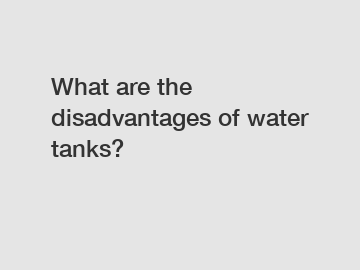What are the disadvantages of water tanks?
What are the Disadvantages of Water Tanks?
Water tanks have become an increasingly popular choice for storing water in both residential and commercial settings. They offer numerous advantages such as providing a reliable source of water during water shortages or emergencies, reducing dependence on municipal water supplies, and promoting water conservation. However, it is important to consider the disadvantages of water tanks before investing in one. In this article, we will discuss some of the drawbacks associated with using water tanks.
1. Initial Cost and Installation Challenges.

One of the primary disadvantages of water tanks is the initial cost and installation challenges. The cost of purchasing a water tank can vary greatly depending on its size, material, and features. Additionally, the installation process can be complex and may require professional assistance. This can add to the overall cost of setting up a water tank system, making it a significant investment for some individuals or businesses.
2. Limited Storage Capacity.
Another drawback of water tanks is their limited storage capacity. The size of the tank determines the amount of water that can be stored at any given time. For households or businesses with higher water demands, such as those with larger gardens or livestock, a small water tank might not be sufficient. In such cases, multiple tanks or larger-sized tanks may be required, further increasing the investment.
3. Space Requirements.
Water tanks, especially larger ones, require significant space for installation. This can be a challenge for properties with limited outdoor space, such as apartments or urban areas. Planning and finding adequate space for a water tank system can be a constraint, and in some cases, it may not be feasible to have a water tank at all.
4. Maintenance and Cleaning.
Water tanks need regular maintenance and cleaning to ensure the quality of the stored water. Sediment, algae, or other contaminants can accumulate over time, affecting the taste and cleanliness of the water. Cleaning the tank and its filters can be time-consuming, and neglecting this task may lead to water contamination. Therefore, it is necessary to factor in regular maintenance and cleaning when considering the disadvantages of water tanks.
5. Vulnerability to Extreme Weather Conditions.
Water tanks are exposed to the elements and can be vulnerable to extreme weather conditions, such as intense heat or freezing temperatures. In areas with extremely hot climates, the water stored in the tank may become excessively warm, affecting water quality and making it less desirable for consumption. On the other hand, freezing temperatures can cause damage to the tank structure, leading to leaks or cracks. Proper insulation or protective measures must be taken to mitigate these risks.
In conclusion, while water tanks offer several advantages, it is essential to consider their disadvantages as well. The initial cost, limited storage capacity, space requirements, maintenance needs, and vulnerabilities to extreme weather conditions are factors that need to be deliberated upon before investing in a water tank system. Conducting thorough research, consulting professionals, and assessing individual water needs are necessary steps to make an informed decision.
If you have any questions or require further information about water tanks, please do not hesitate to contact us. We are here to assist you in finding the most suitable solution for your water storage needs.
If you are looking for more details, kindly visit sectional water tank, media filler, louver manufacturer.
85
0
0


Comments
All Comments (0)